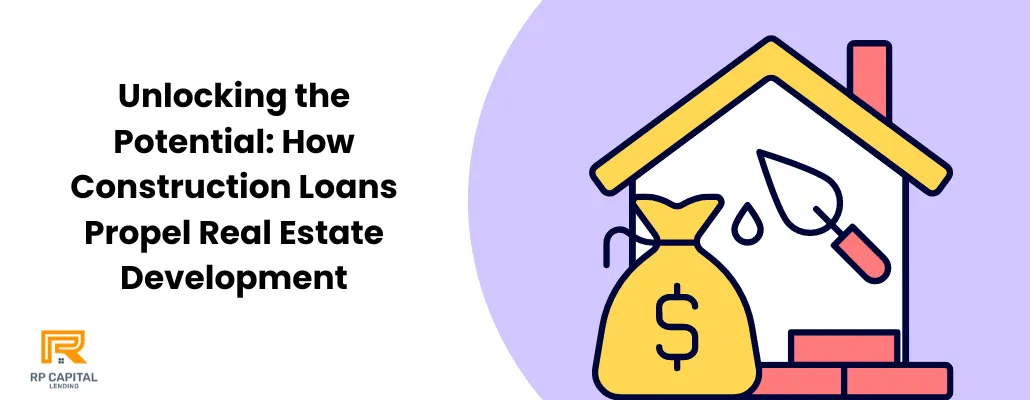Blog

Unlocking the Potential: How Construction Loans Propel Real Estate Development
In the realm of real estate development, securing the right financing can be the difference between a project's groundbreaking success or its unseen potential.
Amidst the array of financial instruments available, construction loans emerge as a beacon of opportunity, offering a tailored solution that aligns with the unique timelines and needs of development projects.
This blog delves into the myriad benefits of construction loans, unfolding how they can be the linchpin in realizing the visions of developers and investors alike.
The Catalyst Behind Construction Loans
At the heart of every real estate development project is a vision. Yet, bringing this vision to life requires more than just a blueprint; it necessitates a robust financial foundation. Construction loans offer this support, acting as a catalyst for transformation. But what makes these loans so pivotal for developers?
Flexibility in Funding
Construction loans are renowned for their flexibility. Unlike traditional loans, which provide a lump sum upfront, construction loans disburse funds in stages, aligning with the project's milestones. This phased financing approach ensures that funds are available exactly when needed, optimizing cash flow and reducing the carrying costs during the critical phases of construction.
Tailored Terms to Match Project Timelines
One size seldom fits all in the world of real estate development. Construction loans recognize this, offering customizable terms that can be adjusted to match the project's timeline. Whether it's a short-term project requiring rapid completion or a long-term development with phased rollouts, the loan terms can be tailored to suit, providing developers with the flexibility to plan and execute their projects without financial strain.
Acting as a Bridge to Permanent Financing
Construction loans serve as a vital bridge, transitioning the project from groundbreaking to completion. Upon project completion, these loans can often be converted into permanent financing at more favorable terms. This transition from construction to permanent financing ensures a smooth pathway for developers, eliminating the need for multiple loan applications and the associated costs.
Mitigating Risk with Predefined Draw Schedules
Risk management is paramount in real estate development. Construction loans mitigate this risk through predefined draw schedules, which tie the disbursement of funds to the completion of specific project milestones. This ensures that funds are utilized efficiently, and projects progress as planned, providing a safeguard against cost overruns and delays.
Unlocking the Potential of Undeveloped Land
Perhaps one of the most significant benefits of construction loans is their ability to unlock the potential of undeveloped land. By providing the necessary capital for infrastructure development, such as roads, utilities, and other essential services, these loans enable developers to transform raw land into viable development projects, increasing its value and attractiveness to investors and buyers.
Navigating the Landscape: FAQs on Construction Loans
Q1: How do construction loans differ from traditional mortgages?
Unlike traditional mortgages that provide a lump sum for purchasing existing properties, construction loans offer phased funding for developing new projects, with terms tailored to the project's lifecycle.
Q2: Can construction loans cover the cost of land?
Yes, many construction loans can include the cost of acquiring land, making them a comprehensive financing solution for developers starting from scratch.
Q3: Are there interest-only payments during construction?
Typically, construction loans require interest-only payments during the construction phase, focusing on the principal repayment once the project is completed and converted into permanent financing.
Q4: How is the interest rate determined for a construction loan?
The interest rate on construction loans can vary based on the project's risk, the borrower's creditworthiness, and prevailing market rates, often calculated as a variable rate above a standard benchmark.
Q5: What happens if the project goes over budget?
Going over budget requires open communication with the lender to discuss additional funding options or reevaluating the project's scope. It underscores the importance of meticulous planning and risk management from the outset.
Conclusion
In conclusion, construction loans stand as a cornerstone in the realm of real estate development, offering a blend of flexibility, customization, and strategic financial support that is unparalleled by other financing options.
They not only facilitate the smooth progression of projects from inception to completion but also empower developers to overcome financial hurdles, manage risks effectively, and unlock the full potential of their visions.
As the landscape of real estate evolves, the importance of understanding and utilizing construction loans will only grow, making them an indispensable tool in the developer's arsenal for turning groundbreaking ideas into successful, tangible realities.
Disclaimer: Loans only apply to non-owner occupied properties. Rates, terms and conditions offered only to qualified borrowers, may vary upon loan product, deal structure, other applicable considerations, and are subject to change at any time without notice.
Copyright © 2025. All Rights Reserved.


